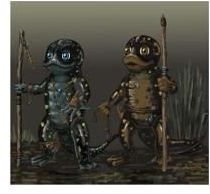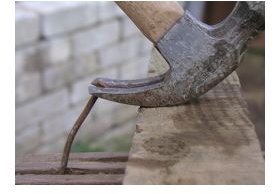Wikipedia's Crusade Against Threshold RPG and Gaming History
Online Gaming as a Community
Online gaming history has always been fragile due to the transitory nature of internet sites and web based information. Wikipedia was supposed to be one of the checks on that - a powerful catalog of information supported by good software and active maintainers. But there is a dirty little secret at Wikipedia: they don’t want to preserve historical information about online games, MUDs, Threshold RPG, et cetera. They want them gone, and they want them gone now.
This is a hot story right now in the MUD/MMO blogosphere and online gaming press. I am getting to it a bit late, which is inexcusable since the game at the forefront of the story, Threshold RPG, is created and run by my company: Frogdice. What follows is my attempt to summarize what happened to the best of my knowledge, understanding, and recollection. I will then try to share some analysis and ideas for the future.
A Little Background on Wikipedia Culture
Before I begin, I need to explain something about the current status of Wikipedia culture and Wikipedians. There are huge numbers of editors there whose main reason for participating is the goal of becoming an administrator. To become an administrator, you need contributions. Contributions are edits in all forms: new content, corrections, and deletions. Most of the obvious topics already have articles, so it is hard to come up with something new to create. Furthermore, creating, researching, and sourcing new articles is a lot of work that also requires a certain amount of creativity and writing skill. Well, editors with visions of adminhood dancing in their heads are not too thrilled about that. They want to be admins now! They want the power to block and ban people! They want the power to lock pages! They want power they can lord over the millions of people who use Wikipedia! Sad, but true.
In addition to contributions, you also need to do administrator-like things (to the extent you can as a regular editor). Cleaning up Wikipedia in the name of “making it a better place” is a great example. Exposing “troublemakers” to higher ups so they can be banned or locked is another example.
Are you putting 2 and 2 together yet? The best way for an editor to become an admin is get lots of stuff deleted, and get people you irritate while doing it banned. By doing all of that you will be seen as a champion of Wikipedia and awarded with administrator powers. The next crop of wanna-be administrators will suck up to you in their hope of ascension, and the cycle continues.
How It All Began
What follows is a very detailed recounting of what happened to Threshold’s article. Sadly, this story is neither unique nor rare.
1) In September of 2008 Threshold RPG’s entry came under attack. An editor bucking for admin powers (we will call him WA for “Wannabe Admin”) and an administrator friend of his (we will call him AB for “Admin Buddy”) discovered the vulnerable Threshold article and started poking it for signs of life. Minor edits and criticisms of the article were met with no response from long term editors of the article. Seeing their chance for an easy deletion and suspecting little resistance, they gutted the article and removed more than half the relevant content.
Eventually, a few original editors (OEs) showed up. The OEs were unhappy. They accepted some of the reasons given for the removals, like the a need for more citations, and got to work finding them. As the OEs found citations and references, they would add them to the article along with the old content that depended on them. Strangely, when the OEs did this, they would get banned for “reverting” or “edit warring.” Some were labeled “sockpuppets” (alternate accounts) and were banned for that instead. If any of the OEs got annoyed by this, or accused WA or AB of vandalizing the article, they would get banned by AA for “failure to assume good faith.”
Banning in this manner is completely forbidden by Wikipedia policy. Furthermore, when an administrator works on an article as an editor (making edits, changes, etc.), he is supposed to refrain completely from using admin powers when dealing with other editors. They are supposed to seek a third party. Surprise surprise, that never happened.
2) Once WA and AA had the OEs safely out of the way, an “Article for Deletion” (AfD) was proposed. This is a minimum 5 day discussion on whether or not the article should be deleted. WA and AB rallied their buddies to show up and vote DELETE, and even went so far as to comb through old edits of the article to find editors whose comments sounded like they would likely vote to delete.
Next: Read on to page 2 to find out about the gaming community’s reaction.
Don’t Underestimate the Gaming Community

3) The reaction was immediate and significant. Many people showed up to vote KEEP and attest to the notability of Threshold. The deletionists’ main argument was that Threshold was not notable enough for Wikipedia - an utterly absurd argument. Threshold has been in operation for almost 13 years, is (to my knowledge) the only role play enforced game EVER commercially available, and is especially unique in areas of in-game politics, law, and religion. Recognized experts in the field quickly posted about the issue on their blogs, attesting to the notability of Threshold. Among these experts were Dr. Richard Bartle (creator of MUD1 - the first MUD/MMO ever and the most recognized expert in the field) and Raph Koster (a developer on LegendMUD, Ultima Online, Star Wars Galaxies, and more).
4) As people showed up to vote KEEP, they were frequently branded “sockpuppets”, banned, and their comments stricken from the discussion. Amazing, huh? When some of those users went to a MUD web site (Top Mud Sites) to discuss their banning, Wikipedia admins showed up, accused the people there of “canvassing” (trying to rally and influence people to vote), and insulted them repeatedly. A user who most people believe was WA made the following comment: “If you had been polite and asked for help instead of being abusive, your article might not be in trouble now. Plus, running home to your favorite forums and beating the war drum is a particularly lame response. If you’d taken the effort to read Wikipedia’s policies as you require others to read Threshold’s, you would not be in this situation.”
So the key to an article not being deleted is apparently kissing up to the insiders, and it is “lame” to discuss your plight anywhere on the internet after you get banned. Also, note the final comment. How does this person, who accused everyone else of Conflict of Interest, know anything about Threshold’s rules? You guessed it… Turns out WA was a formerly banned player of Threshold. He played the game underage almost 10 years ago. My, that is a long time to hold a grudge. One has to wonder how someone could muster the gall to label a game “non-notable” when it is still around 10 years after you played it as a teenager. But I digress…
Wikilogic: A New Type of Insanity
5) In a move that can only be called INSANE, the deletionists argued that the articles and declarations from these experts lent notability to Wikipedia, not Threshold, since Dr. Bartle and Mr. Koster were making their points in the context of the ongoing deletion attempt. Furthermore, the deletionists accused them of being puppets of “canvassing”, and that I somehow cajoled them into making their statements. These are reputable figures in the industry who care deeply about their reputations. They do not blithely go about acknowledging the notability of any game unless it is something they truly believe. The accusations were not only ridiculous, but incredibly insulting.
6) Those they did not ban often suffered other attacks. The owner of Top Mud Sites participated in the discussion (voting KEEP). Soon after his vote, the links to his site in the general MUD entry were deleted. When he added it back, it was removed again. Retaliatory editing is supposed to be against the rules.
7) The AfD ended up being one of the largest, if not THE largest, in the history of Wikipedia. That fact alone should be a hint about Threshold’s notability. Four days into the five day AfD, the tally was 57% voting KEEP, and 43% voting DELETE. Wikipedia policy requires that a CONSENSUS TO DELETE must be reached, or else the article is kept. Momentum was continuing to build for the KEEP side - particularly as negative media attention piled onto Wikipedia for the abusiveness of its administrators, and the absurdity of the deletion attempt itself.
Next: Continue to page 3 to find out the result of the AfD and what ensued following its closure.
Ignore All Rules - Their Excuse to Do Anything

8) With more than a full day still remaining on the AfD, and almost every new vote going KEEP, a “closing admin” showed up and closed the AfD. The final vote was 17 delete, 22 KEEP, and he somehow concluded that was a consensus to DELETE. Another reason he listed for deleting it was a (paraphrasing since they have taken it down) “Furthermore, those voting to keep did nothing to improve the article during the AfD.” Three problems with that last part.
- We DID try to improve it. Every time we tried to add more references, one of the deletionists removed it.
- Why kill yourself working on an article when it is clear you are being railroaded and the article will be deleted no matter what?
- According to Wikipedia policy, that is absolutely NOT a valid consideration for ruling on an AfD. In short, the closing admin completely ignored or violated almost every principle of the AfD process.
10) A deletion review (DRV) was opened. In that discussion, most of the deletionist’s argument centered around accusing KEEP voters of being “sockpuppets” who showed up because of “canvassing.” This ignored the fact that many of the KEEP voters were not part of the gaming community in any way. Canvassing is apparently a catch all excuse they use whenever a side gets more support than they expected or hoped. To make it worse, there was actual evidence of canvassing by the deletionists. WA’s user page had references to him emailing former negative editors of the Threshold article (like one editor who repeatedly added a link to a site with stolen Threshold IP), and requests for people to join #irc channels to discuss the AfD. WA’s cherry picking of former editors is specifically forbidden by Wikipedia’s rules, but you know the drill by now: rules are ignored when it suits the inner cabal types.
Gaming Media Outrage
I should note that starting around #3 of that list, the issue started to get attention from the gaming media - first blogs, and then later gaming news sites. Here are a few links to blog entries and stories about the situation:
- Threshold - Dr. Richard Bartle, Creator of the first MUD/online game. Foremost world authority on online games.
- Losing MUD History - Raph Koster, Developer of Ultima Online, Star Wars Galaxies, and other MMORPGs.
- Wikicrap - Scott Jennings (Broken Toys), Developer of Dark Age of Camelot and other online games.
- Wikipedia Strikes Again - Samson (Empire of the Iguanadons), MUD Code and Gaming blogger.
- MUD history dissolving into the waters of time - Massively.com, Major MMORPG industry site.
- Erasing History: Wikipedia Wiping All Traces of MUD - Hellforge, Gaming news site.
- Shifting Sands: EGM and Threshold MUD - MMO blog.
My Evaluation of the Current Wikipedia
1) Wikipedia is broken - possibly beyond repair.
2) Wikipedia has too many people desperate to become administrators for all the wrong reasons. It is not about the “project” as they like to call it, but about the power, recognition, and perceived (in their own minds) status. The system is designed so the only way to move up is tons and tons of edits, and negative edits (and deletions) are easiest. You also need to be involved in a lot of administrative actions (getting people banned, blocked, or otherwise scolded) to prove you understand the way administrative policy works. The system encourages deleting things and either bullying people into getting censured or inciting them enough that they do something you can tattle on them for.
3) Many Wikipedia “editors” are horrendously full of themselves, and believe they possess skills they actually do not. The fact that they call themselves editors is the first problem. They should be called users. Being an editor requires some kind of actual knowledge about writing or research. Most of these people have neither.
4) Many Wikipedia “editors” are perfect examples of the expression “a little knowledge is a dangerous thing.” They read through Wikipedia policies, master a few buzz words that sound official and sophisticated, and then believe they have a PhD in journalism, English, or some research related field. The truth is, they have almost no experience with formal research methods, professional writing, journalism, editing, or even basic composition. Since they do not understand the reasons for a rule, they are woefully unable to apply the rule properly. They misquote rules, they cite rules while only paying attention to 5% of the rule’s actual text, and they ignore rules that would make a situation go against them.
A perfect example of this is the way they interpret “Conflict of Interest” or “COI” as they call it. They do not understand the reason for this rule, so they just assume any input from someone connected to the subject matter is forbidden. What they fail to grasp is the reason for this rule (and NPOV: neutral point of view) is to avoid self-serving, inaccurate statements. For many articles, the ONLY possible source for the information is the subject himself or herself. To use a gaming example, if an important part of an article is knowing what specific action was taken by developers of a game, the only source would be those developers. But if you seek those people out for the information, it would be deleted for being “COI”, “NPOV”, or “original research.” Absurd.
Next: Continue to page 4 for the conclusion of the evaluation on Wikipedia and recommendations to improve the current situation.
My Continued Evaluation of Wikipedia
5) Wikipedia has absolutely no respect for experts. While actual policies show respect for experts, most of the people who control Wikipedia do not. Many Wikipedians frequently demonstrate extreme hostility towards the involvement of experts. They will start with the COI and NPOV excuses, and then they will argue experts were only consulted as a result of “canvassing.” This attitude towards experts is the complete opposite to the way academics and researchers treat experts, and is another reason the information on Wikipedia is unreliable and increasingly inaccurate.
6) The obsession with deleting obscure topics is a slow suicide. Obscure topics is what Wikipedia does best. Paper publications are forced to prioritize based on notability because they are creating a physical object. As one of their policies states, “Wikipedia is not paper.” It does not have these limitations. If someone were doing serious research, Wikipedia would be a horrible place to go. The information is unreliable and no serious audience, professor, or professional would accept the sources. But for obscure stuff, pop culture, niche areas, etc., Wikipedia is amazing. If you need information about an old, canceled TV show, out of print comic books, rare toys, or anything like that, Wikipedia is a great resource. Sadly, the current trend is to get rid of all that stuff since it is not terribly notable. So what if it isn’t notable? Who cares about notability? If notability was so great, we’d be using Encarta. Wikipedia is playing towards its weakness and completely surrendering its area of strength. That is more than a shame. It is a tragic loss for everyone.
7) Too much of Wikipedia’s leadership is corrupt. The system is the beginning of the problem as I already noted. But on top of that, the degree to which Wikipedians protect their own is absolutely astonishing. If you have enough edits and enough friends you can do whatever you want. You can run roughshod over “outsiders” and then bury them in various “tattle tale methods” to get them in trouble. The different ways you can report someone for censure is amazing. There have to be at least 6 or 7 different ways to report someone that I either experienced or witnessed, and I have read about another 5-10. The experienced insider will use one after another to get rid of whoever they don’t want around.
How to Fix Wikipedia

1) Dump WP:N (notability). Worry about verifiability and accuracy, but forget notability. It is too subjective, and the result of it is a loss of interesting, valuable information.
2) Make all adminships temporary. You get 1 year as an admin, and then you spend at least 1 year as a regular editor.
3) Stop deleting obscure or niche topics.
4) Hire a lot more paid staff to be your “real administrators.” These people need to be under constant review to prevent abuse, and their main job should be to patrol the volunteer administrators for inappropriate behavior. There should be a very low tolerance for suspicious behavior. Wikipedia has a huge pool of potential administrators. They can fire with impunity for questionable actions.
5) Call editors “users.” Call administrators “editors”. For both groups, it will take their egos down a notch.
6) Narrow it down to *1* way to report someone for bad behavior.
My Solution for MUDs/MMOS
We need to start recording MUD and MMO history now. We need to do it in an organized fashion that will be respected not just by the hacks at Wikipedia, but by an academic or other legitimate researcher. MMOs seem huge and mainstream now, so it is hard to imagine people considering them insignificant. But that is how we felt about MUDs 10 years ago, and nowadays many gamers don’t even know what a MUD is (or they are dismissive of them in the extreme).
This is a cautionary tale for people with interest in any obscure or niche topic. Wikipedia cannot be relied on to preserve history or information about non-mainstream topics. The current culture actually discourages it. It is our responsibility to find better ways to preserve such information, lest it be lost to the vicissitudes of time.
Update: January 12, 2009
Thanks in part to a huge outcry in the gaming media, this issue finally attracted some objective, rational editors and administrators who actually care more about Wikipedia than their contribution score. Since that time, the Threshold article has been restored and is being worked on. Sadly, it has also been proposed for deletion 3 more times, and the “usual suspects” are still trying to get it deleted (again). This goes to show there are indeed good editors and administrators working on Wikipedia. Tragically, they suffer and rail against the same self-serving deletionist movement as everyone else.
Update: July 2, 2011
One of the more open minded admins involved in the whole snafu has risen in the ranks since this incident. He contacted the staff of Threshold to let them know that this specific incident resulted in significant reforms at Wikipedia as far as the deletionist movement and how AfDs would be handled going forward. It is still, to this day, the largest AfD discussion in the history of Wikipedia.
